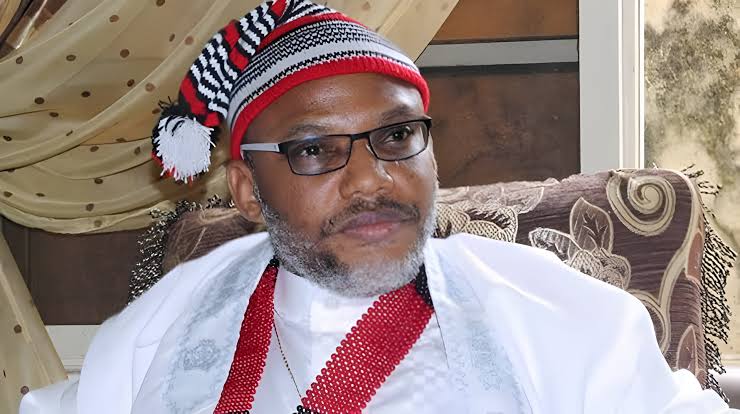
Nnamdi Kanu Dares Prosecution to Cite Law Behind His Trial – They Fail
Abuja, Nigeria – October 28, 2025
In a dramatic session that resonated far beyond the courtroom, the illegally detained leader of the Indigenous People of Biafra (IPOB), Mazi Nnamdi Kanu, on Monday challenged the jurisdiction of the Federal High Court in Abuja to try him, insisting that the entire process was built on illegality and political persecution.
Appearing before Justice James Omotosho under tight security, Kanu argued that the Federal Government had no legal grounds to prosecute him, describing the proceedings as unconstitutional and void.
“There is no extant law in this country upon which the prosecution can predicate the charges against me,” Kanu declared, stressing that the court lacked jurisdiction to entertain a matter arising from an extraordinary rendition, an act already condemned under both Nigerian and international law.
Kanu’s position marked a decisive shift in the proceedings. Rather than waiving his right to defend himself, the IPOB leader challenged the prosecution to name the law under which he is being tried.
The prosecutor, Chief Awomolo, SAN, failed to cite any existing law that establishes the offences alleged against Kanu, a lapse that reinforced the defendant’s argument that the entire prosecution lacks a legal foundation.
Both the United Nations Working Group on Arbitrary Detention and the Court of Appeal in Abuja had previously ruled in favour of Mazi Nnamdi Kanu, declaring his detention unlawful and ordering his immediate release.
In its 2022 report, the UN body held that Kanu’s extraordinary rendition from Kenya violated international law and amounted to arbitrary detention, urging the Nigerian government to free him unconditionally and provide reparations.
Similarly, the Nigerian Court of Appeal, in a landmark judgment delivered on October 13, 2022, struck out all terrorism-related charges and affirmed that no court in Nigeria had jurisdiction to try him, given the illegality of his rendition.
However, the Nigerian government has since blatantly defied both rulings, keeping Kanu in solitary confinement in disregard of domestic and international legal obligations.
Legal observers noted that the unlawful prosecution had relied heavily on anonymous witnesses who claimed to be security operatives and “technical experts,” none of whom provided any evidence linking Kanu to any crime.
“The Federal Government has only sought to criminalize political expression,” said Abuja-based lawyer Barrister Kenneth Orji, describing the trial as “a judicial overreach driven by fear of dissent.”
Justice Omotosho, responding to Kanu’s jurisdictional challenge, directed him to file written addresses outlining his arguments on the competence of the court to proceed with the trial. The matter was adjourned to November 4-6.
The judge also advised Kanu to consult senior counsel to refine his arguments.
IPOB reiterated that his continued detention and prosecution violate international conventions, particularly the United Nations Convention Against Torture and the African Charter on Human and Peoples’ Rights, both ratified by Nigeria.
“This entire trial violates both domestic and international law,” IPOB lawyers said. “He was abducted, tortured, and brought to Nigeria unlawfully. The Nigerian government is using the instrument of the judiciary to silence dissent.”
Despite his prolonged solitary confinement in the Department of State Services (DSS) facility, witnesses noted that Kanu appeared calm, articulate, and unwavering in his defence of the Biafran cause.
Following the proceedings, Nigerians and several human rights advocates renewed calls for Kanu’s immediate release, condemning the government’s persistent disobedience of multiple court orders that had previously granted him bail.
Civil society groups also expressed concern over what they described as “the deliberate weaponization of the judiciary against a political prisoner.”
“The Nigerian government has turned a legitimate call for self-determination into a criminal act,” said a rights activist in Abuja. “If this continues, it erodes public confidence in the justice system.”